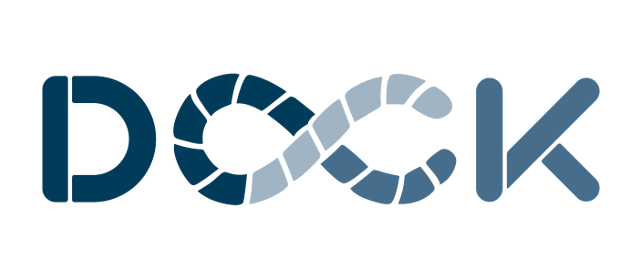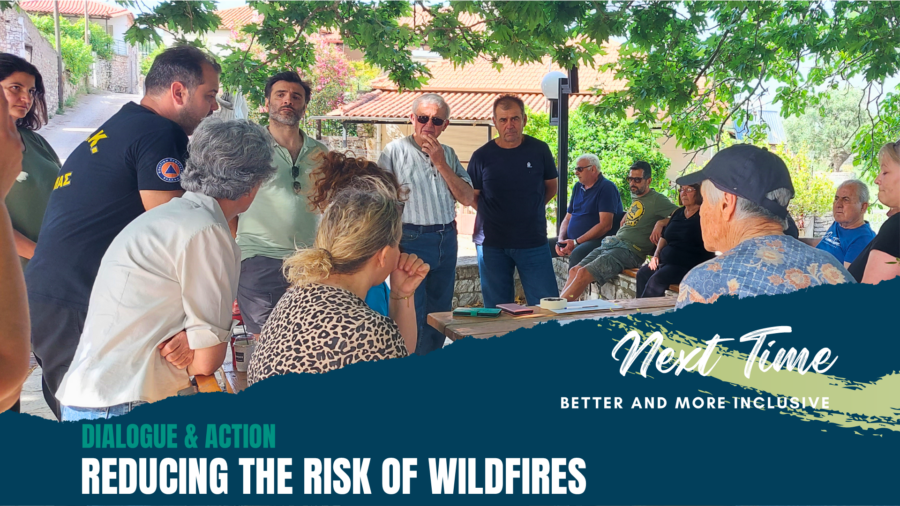Dialogue & Action Against Wildfires: Empowering Communities for Disaster Resilience
“Dialogue & Action Against Wildfires” is a project led by Dock, in response to ACCTING’s call for pilots Next time better and more inclusive. This call aimed to co-create a scenario for handling a disaster using a bottom-up approach, to inform and trigger a behavioural change in actors from local communities as well as from authorities.
Dock – Social Solidarity Economy Zone is a non-profit organisation located in Athens, Greece. It envisions SSE as an alternative way of organising economy and society based on the values of Solidarity, Sustainability and Social Justice. It aims to contribute to the visibility of SSE in Greece by organising public events, to empower SSE enterprises and initiatives by providing information, educational programmes, business support, seminars and tools.
The project focused on a cluster of four mountainous villages in Messinia, Peloponnese, Greece. With 570 inhabitants and 3.900 hectares rich in natural and cultural heritage sites, these villages serve as a microcosm that could model wildfire resilience for similarly at-risk territories.

The project
The project aimed to raise awareness and build the necessary capacity and social and civic infrastructure to not only prevent devastating fire damage, but also to form a coordinated, community-based response that can protect lives, homes, and natural resources.
Through a participatory design process prioritising the needs and experiences of the most vulnerable groups, this project sought to convert vulnerability into resilience, empowering locals not just for surviving wildfires, but for transforming their communities into “Fire Smart Territories”.
Activities
Activities the project proposed to undertake included:
- establishing a cross-sectoral advisory board including local government officials, key community figures, and representatives from vulnerable groups like the elderly and women.
- conducting hands-on, collaborative scenario-planning exercises in each targeted village, followed by simulated disaster response drills using local resources.
- setting up both physical and digital platforms to facilitate open community discussions on vulnerabilities, equality, and the ethical dimensions of disaster management.
- methodically analysing and converting all lessons learned and data collected into a set of actionable policy recommendations. These recommendations will then be presented to local and regional policymakers, aiming for long-term, systemic change.
By directly involving these vulnerable groups in the participatory design and outcome-based discussions, the project aspired to take a more inclusive, democratic, and truly community-led approach to wildfire prevention and response. Initiated in a cluster of four villages, the project is designed for scalability, both geographically and methodologically, and could be extended to nearby villages.
The project progressed through six key phases:
- Phase one established stakeholder engagement and set the groundwork for collaboration by forming a management team and local coordination committees.
- Phase two raised awareness and gathered input through community events and surveys, ensuring inclusivity by engaging vulnerable groups like women and the elderly.
- Phase three developed community-specific disaster risk scenarios using local knowledge and infrastructure assessments, resulting in actionable draft plans.
- Phase four refined these drafts through community feedback mechanisms such as voting, puppet theatre, and cultural events.
- Phase five finalised the disaster scenarios, reviewed outcomes, and highlighted differences in readiness across villages.
- Phase six focused on dissemination and advocacy, compiling a toolkit of resources and organising a forum that brought together diverse stakeholders, including policymakers, researchers, and local communities, to discuss wildfire management and share the project’s methodologies.
The primary project output is a Forest Fire Risk Reduction Toolkit: This bundle of resources included a community guide, training materials intended for school-based education, four worksheets covering various aspects of fire readiness, and four case studies drawn from each participating village’s experiences.
The project’s community-led disaster risk reduction framework offers a replicable model for other rural regions facing similar wildfire threats. The project emphasised dialogue with both local communities (throughout the Toolkit development) and political and media actors in the project dissemination phase.
This wider engagement has led to promising potential for multiplication of project outputs. Already, individuals from neighbouring villages expressed an interest in using the toolkit to prepare for the next fire season. Many attendees at the forum expressed a desire to replicate or adapt the project’s worksheets and methodology, affirming that the project had moved beyond mere pilot status to become a catalyst for policy dialogue at multiple levels.

